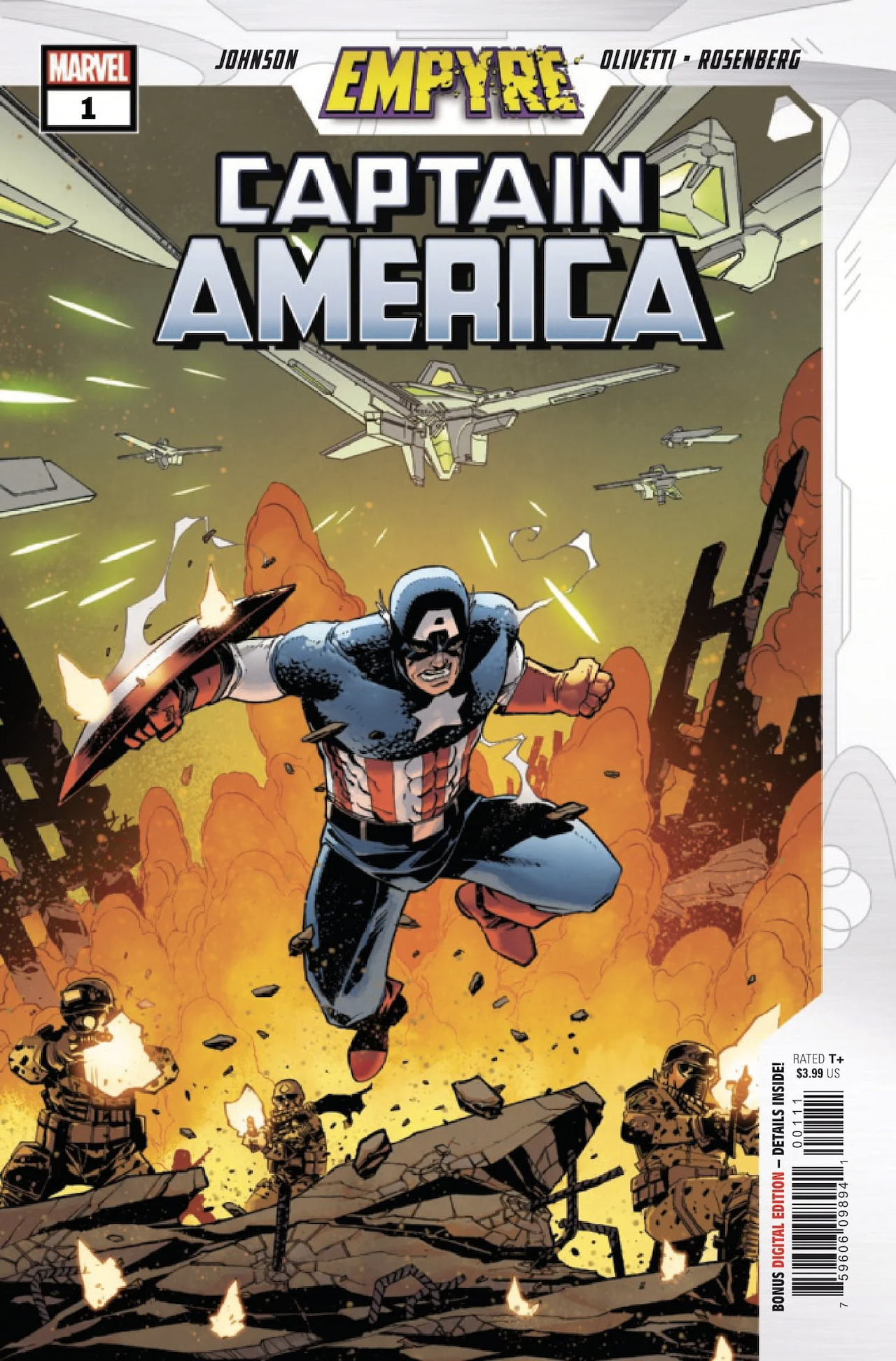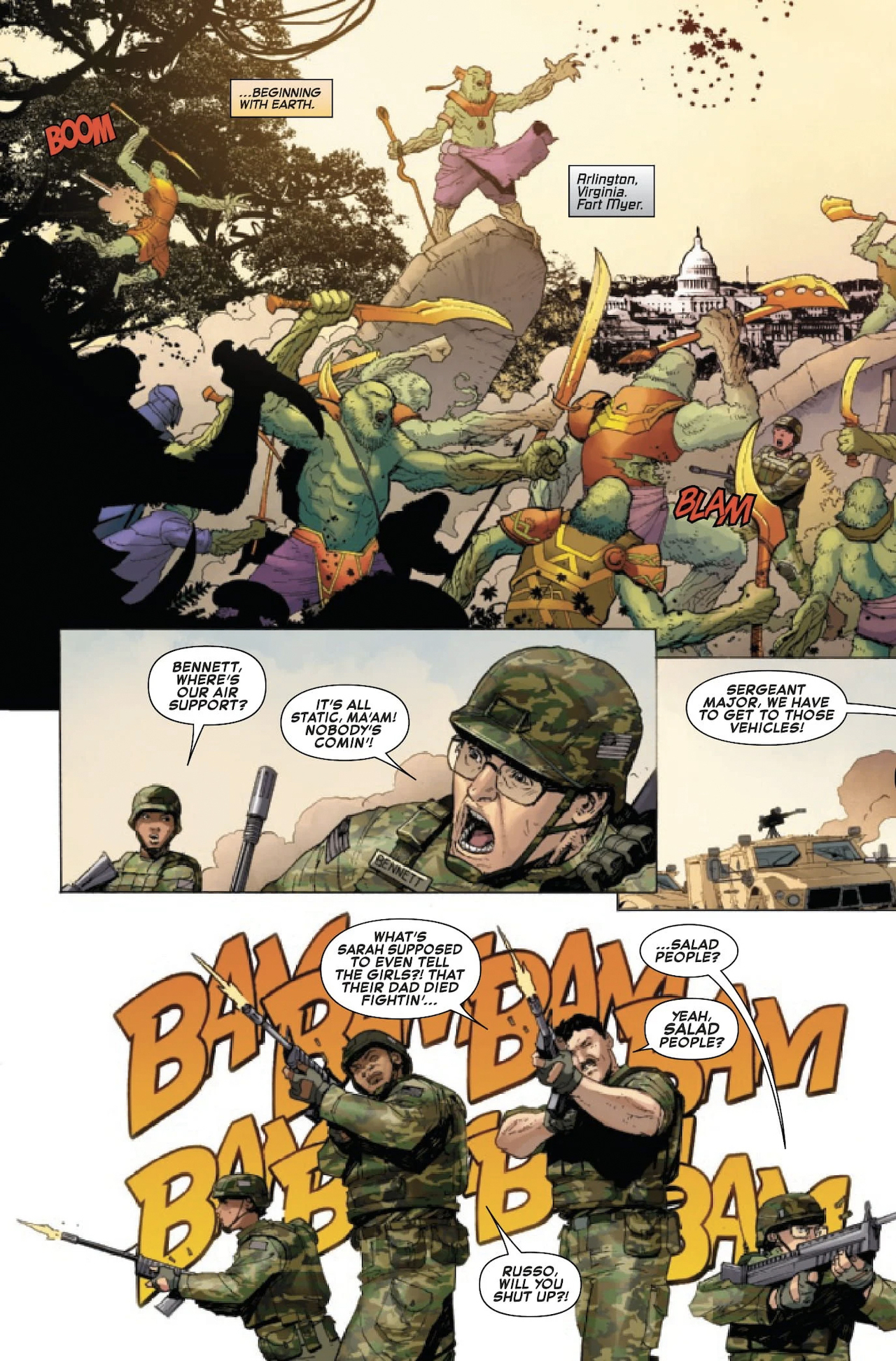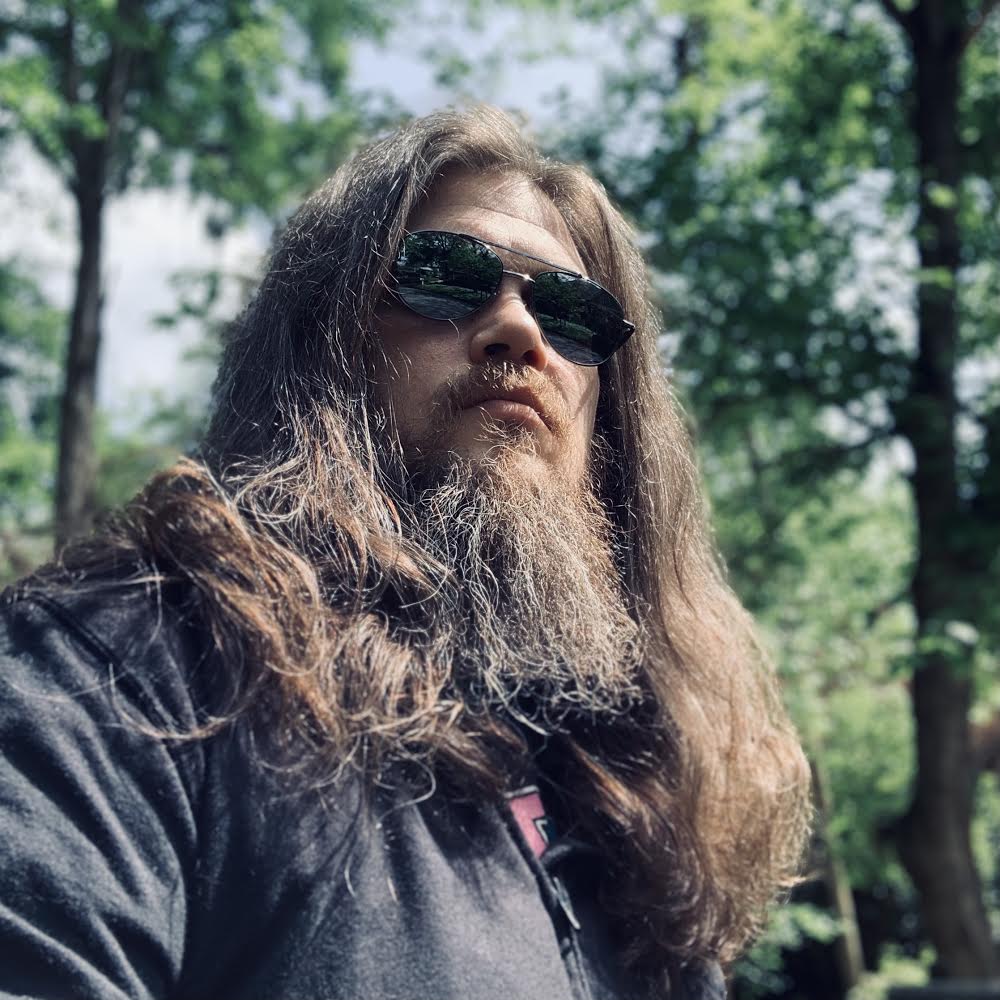Captain America gets "muddy and bloody alongside ordinary soldiers" in Empyre tie-in
Writer Phillip Kennedy Johnson discusses his upcoming Empyre: Captain America limited series
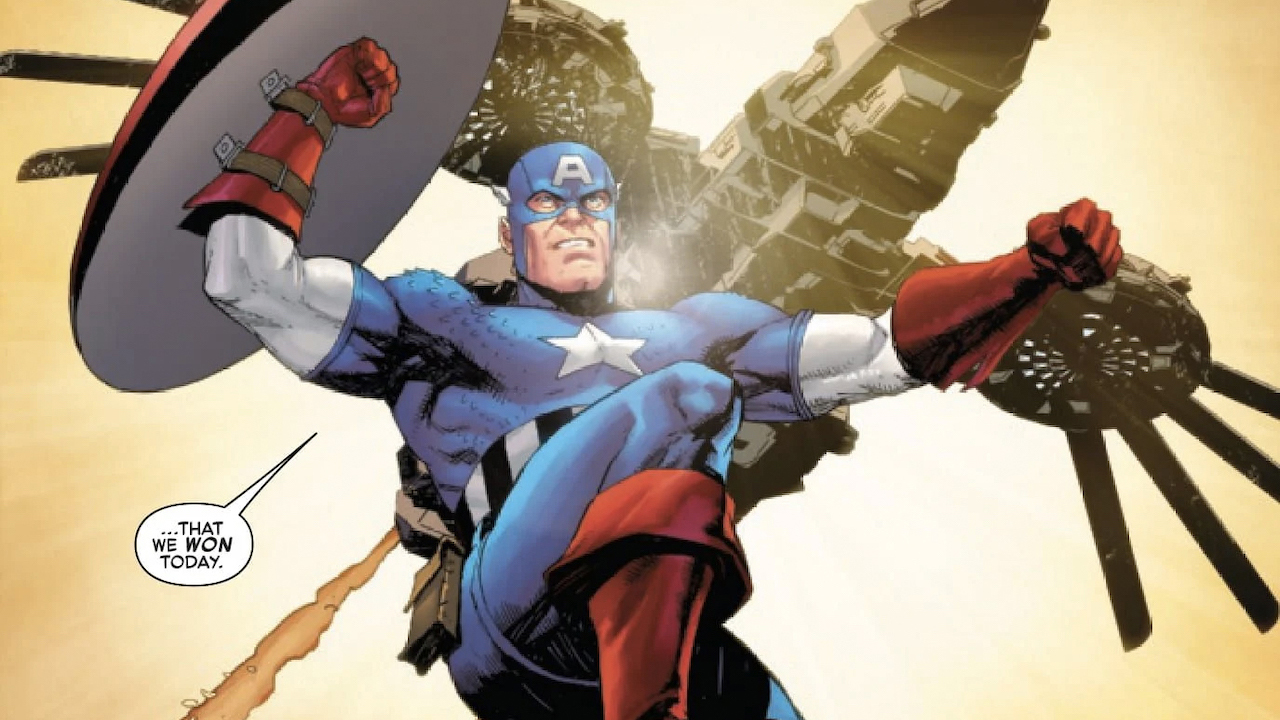
With the official onset of Marvel's summer crossover Empyre, the Marvel Universe has gone to war. And there are few heroes who know what that means better than Captain America – a soldier whose super-heroic service goes all the way back to World War II. And as Steve Rogers enlists in the Cotati conflict with July 29's Empyre: Captain America #1, he's got writer Phillip Kennedy Johnson, himself an active-duty servicemember in the United States military, and artist Ariel Olivetti setting the stage.
Johnson will pit Cap against one of the direst threats in the Cotati army – a warrior with, in the writer's words, "the juice to wipe out all life on Earth." But Cap won't have the Avengers at his back – he'll have normal human soldiers fighting by his side.
Newsarama spoke to Johnson about how his military service offers him a unique position to tell a tale that recalls Cap's WWII adventures with the Howling Commandos, fighting against a foe of almost impossible odds, and how it all ties into the overall picture of Empyre.
Newsarama: Phillip, Empyre is finally kicking off after an industry-wide delay. How has that gap changed your perspective on Empyre? How does it feel now that it's finally coming out?
Phillip Kennedy Johnson: All the creators and editors behind the Empyre stories have been anxious to see these books on shelves, and it's super exciting that it's finally happening. I know creators of all kinds of stories by all different publishers feel the same way, and I very much hope that the books that are still on hold are able to be released very soon.
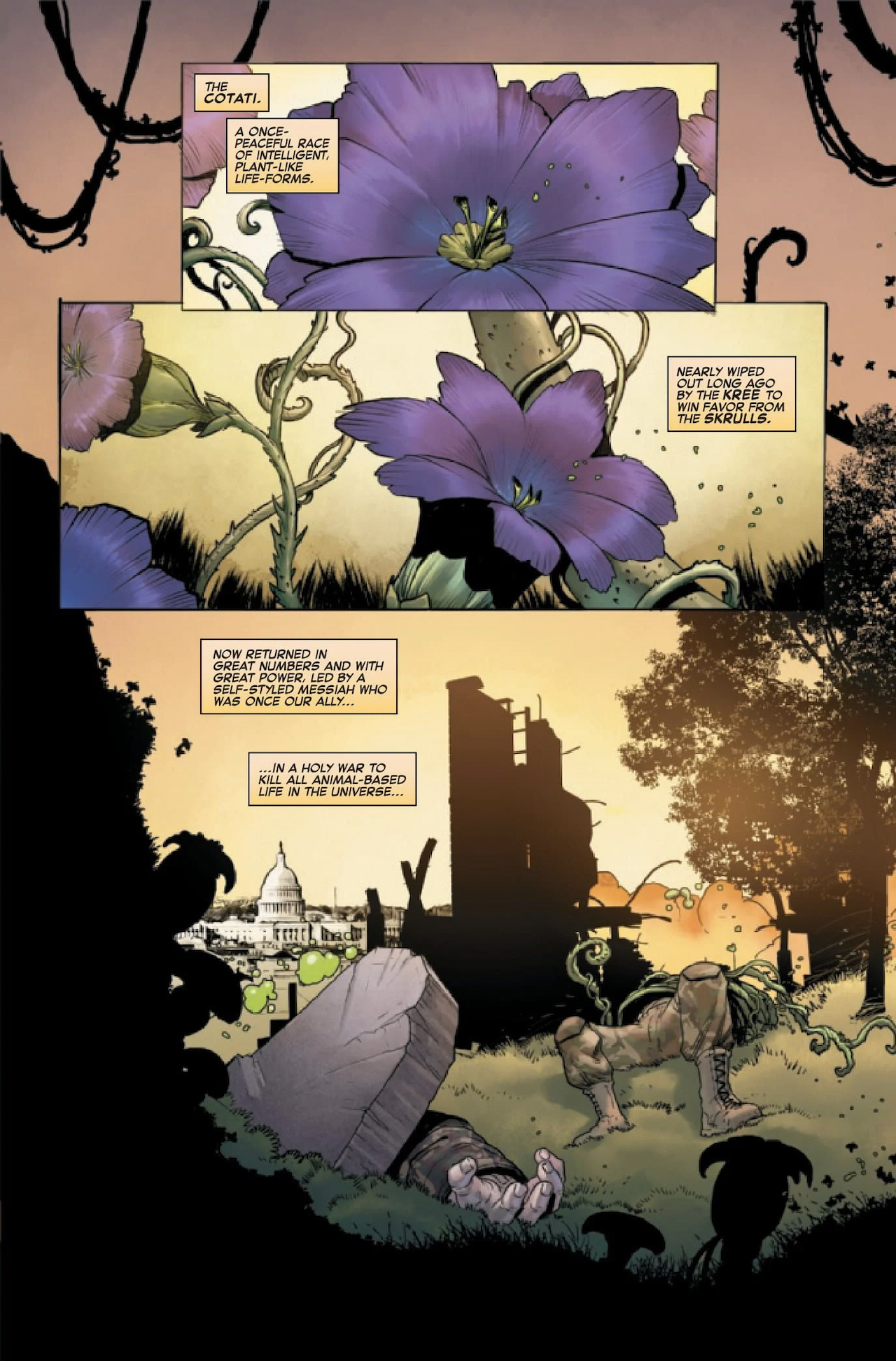
Nrama: Captain America has a long history with the Kree and Skrulls - he was there for the original 'Kree-Skrull War' story. How does that history factor into this series?
Johnson: There are Kree and Skrull characters in Empyre: Captain America, and you definitely see some tension and mistrust there given their complicated history. But the Kree and Skrulls mostly see humans as lesser beings, and they aren't thinking about protecting Earth…they're just here to annihilate the Cotati, and collateral damage is not their concern. Cap obviously has the opposite stance, and he has real problems with the Kree and Skrulls' approach to this war.
Get the best comic news, insights, opinions, analysis and more!
Nrama: Cap has faced down alien invasions plenty of times, but this one is led by the son of former Avengers. How does that affect Cap's mindset going into Empyre?
Johnson: Because of the Avengers' ties with Quoi, they're completely unprepared for his betrayal, and the Cotati get the jump on them at first. It takes all the Avengers a minute to regroup and figure out how to handle this new threat, including Cap. And because Quoi knows the Avengers so well, the Cotati already know about Cap and the danger he poses to their invasion. Cap's definitely coming into this fight at a disadvantage.
Nrama: The solicitation for Empyre: Captain America seem pretty dire, painting a picture of Cap fighting alone against almost certain death. What's Cap up against in this series? What specific arm of the Kree/Skrull empire will he take on?
Johnson: In this miniseries, Cap faces a global invasion that is simply too big for the Avengers to handle alone, and it falls to him to not only mobilize the U.S. military but military forces around the world. Instead of his usual crew of gods, legends, and superheroes, we'll see him getting muddy and bloody alongside ordinary soldiers and civilians who are putting their lives on the line, and who need a leader like Captain America to bring them together.
Meanwhile, one of Quoi's most powerful Cotati leaders leads an attack on Washington, D.C., a war priest named Shi Qaanth who has powers we haven't seen from any of the Cotati up to this point, not even Quoi himself.
Shi Qaanth has the juice to wipe out all life on Earth pretty much by himself, and he takes notice of Cap very early on. He becomes Cap's primary enemy in this miniseries. But since the Kree and Skrull's goals on Earth don't align with Cap's, Cap comes to realize that they also pose a serious threat.
Nrama: You're an active duty member of the military - a background in common with Captain America himself. How does that perspective shape your approach to a story like this, that centers around the outbreak of war?
Johnson: Steve Rogers is a superhero, of course, but he's a soldier first. He's the truest, most idealized representation of the Army values that all soldiers strive to live by, and it's a tremendous honor to write him.
It's also a big responsibility to get him right for all the veterans and active-duty service members who want to feel that pride, kinship, and camaraderie with him whenever they see him on the page. I wanted to include real soldiers in our story, and remind readers of the cost of war, even while delivering the massive sci-fi comic book experience that Empyre promised.
Nrama: Not to be too cute, but what would be going through your mind if you were preparing to fight a massive space empire? How does having some frame of reference for a more grounded idea of military conflict inform your portrayal of Cap himself here?
Johnson: Obviously it would be sobering to go to war with a threat like the Cotati, and like any soldier, I'd have to prepare for the very real possibility that I wouldn't come home. But we wouldn't have to ask ourselves if we were fighting a just war, or if we were on the right side of it. Earth's war with the Cotati isn't a fight over resources, or religion, or politics. Our armies are fighting to defend every person on Earth from certain death. That makes us right, and it will hopefully give us the resolve that we need to win.
Nrama: With a conflict like what's presented in Empyre, readers mostly see the superhero side of things. But there's a human cost to war, which Cap has experienced. How do the realities of military conflict enter into or affect the way you look at a story that is essentially about a massive, global war?
Johnson: Whenever I see Cap on the page, I'm seeing more than the Avenger…I'm remembering the guy who volunteered to join the Army, back when the only things that made him special were his mind and his resolve.
Empyre: Captain America shows Cap primarily in that context, fighting the Cotati alongside other regular soldiers as he tries to convince world leaders to join in the fight. It's still Captain America, so the story is much larger than life, but you see him interacting with soldiers instead of gods.
When you're reading about real people with real limitations, the wins are bigger, and the losses are harder. It's essentially a Howling Commandos story; literally the kind of story Cap was made to tell.
Nrama: You're working with Ariel Olivetti on this series. What's it like working with an artist of his stature?
Johnson: I've been insanely fortunate regarding the artists I've been able to work with, and I never take that for granted. When I found out I'd be working with Ariel, I was blown away.
Whenever I find out who my collaborator's going to be on a book, I find a bunch of their work so I can get a clearer sense of their style and strengths. But with Ariel, there was no need to get anything new. I just walked to my shelf and pulled down a bunch of books I'd owned for years.
Everyone knows what a great artist Ariel is, but when we got started, I was gratified to learn he's also a great collaborator. We often started with different visions for how a layout or thumbnail sketch might look, but he's incredibly receptive to notes and new ideas, and I tried to be as well. As the page moved from layouts to pencils to inks, it was such an amazing experience seeing a loosely sketched page become an Ariel Olivetti page. He's ridiculously talented.
Nrama: What's your favorite thing he drew for this series?
Johnson: Oh, man. He drew so many great moments, but my favorites are the creepy ones. Without spoilers, I'll just say that there's a horror element to the story, and every time one of those moments occurs, Ariel just crushes it. The physicality of the characters, the dynamic quality to the action, and the nuance in the facial expressions make those moments crazy powerful.
Nrama: What's it like working as part of a larger event like Empyre? When you set out to write an event tie-in like this, what are the things you're keeping in mind to craft the story?
Johnson: Any time you write part of a crossover event, consistency and compatibility are key. There's a lot of discussions and comparing of notes happening across the different creative teams…you have to know where the characters are coming from at the beginning of your story, where they're headed after your story is over, which characters are available and which are occupied in other stories, what's happening off-panel at all times. And when there's an opportunity to worldbuild, like we have with the Cotati—making up the rules of their biology, their abilities, their culture, and so on—of course, we all have to be aware of what's happening in the other books so nothing contradicts anyone else's work. There's a lot to keep track of, but it's all hugely rewarding and fun.
Nrama: Bottom line, what do you want readers to know about Empyre: Captain America and its place in the overall event?
Johnson: If you like stories that show Cap going back to his roots, where he's fighting in his truest element—as a soldier, fighting Nazis alongside the Howling Commandos—this story's for you. But there are also enough face-melting sci-fi and horror elements to satisfy the most hardcore genre fan.
I've been Newsarama's resident Marvel Comics expert and general comic book historian since 2011. I've also been the on-site reporter at most major comic conventions such as Comic-Con International: San Diego, New York Comic Con, and C2E2. Outside of comic journalism, I am the artist of many weird pictures, and the guitarist of many heavy riffs. (They/Them)
